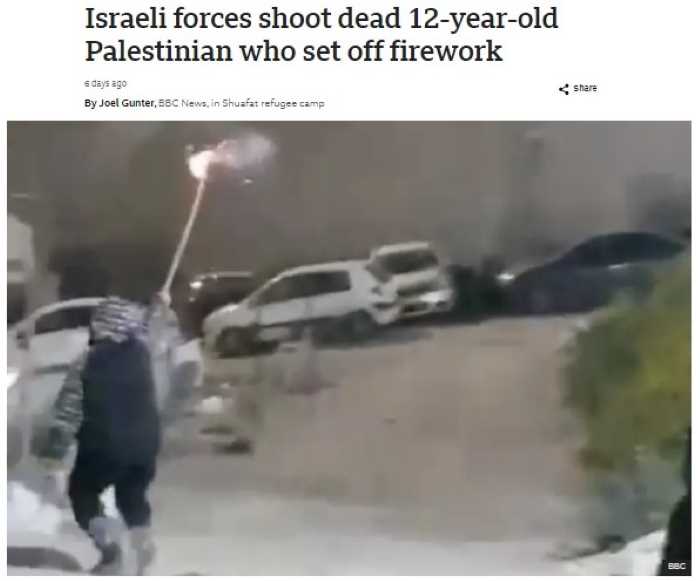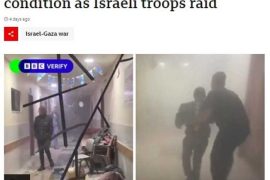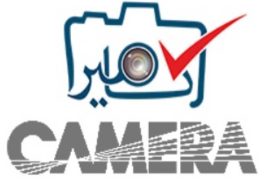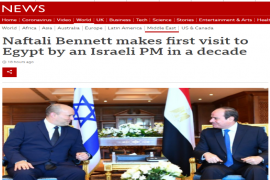On the afternoon of March 13th a report by “senior international reporter” Joel Gunter was published on the BBC News website’s ‘Middle East’ page under the headline “Israeli forces shoot dead 12-year-old Palestinian who set off firework”.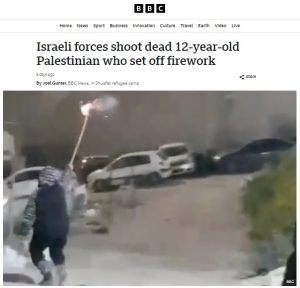
Paragraph nine of Gunter’s account of the incident in Shuafat in which Rami Hamdan Al-Halhouli was shot reads as follows:
“Rami was one of six Palestinians shot dead by Israeli security forces in occupied East Jerusalem and the West Bank on Tuesday, marking a grim start to the Islamic holy month of Ramadan, with the mood already clouded by the war taking place in the Gaza Strip between Israel and the Palestinian armed group Hamas.”
The Tuesday to which Gunter refers was March 12th. On that day two members of Hamas were killed in Jenin when they attacked Israeli troops carrying out an anti-terror operation.

Another incident which took place on the outskirts of Jerusalem on the same evening was reported by the Jerusalem Post as follows:
“…the Border Police said they thwarted five terrorists who were trying to throw Molotov cocktails at vehicles driving between Ramot and Givat Ze’ev on Road 436.
The terrorists threw Molotov cocktails at the road on Monday night, so Israeli forces conducted a covert operation along the road on Tuesday night, catching the terrorists in the act. Border Police officers opened fire at the terrorists, apprehending them and transferring them for medical treatment.
The Palestinian Red Crescent reported that two Palestinians were killed and another three were injured in the incident.”
The two fatalities were identified as Zaid Ward Shukri Khalifa, 23, and Abdullah Mamoun Hassan Assaf, 16.
The identity of the sixth Palestinian whom Gunter claims was “shot dead by Israeli security forces” on March 12th is not clear. He could be referring to a would-be suicide bomber who was killed on the evening of March 11th:

Alternatively, it is possible that Gunter means the fifteen-year-old who stabbed two Israelis at a checkpoint at the entrance to Jerusalem on the morning of March 13th.
Either way, it is glaringly obvious that Joel Gunter’s portrayal of “six Palestinians shot dead by Israeli security forces in occupied East Jerusalem and the West Bank on Tuesday” comes nowhere near to telling BBC audiences the whole story about the circumstances behind any of those incidents.
It therefore comes as no surprise to see that his emotional portrayal of the shooting of Rami Hamdan Al-Halhouli – based overwhelmingly on accounts from his family – likewise fails to fully inform BBC audiences.
Gunter tells BBC audiences that: [emphasis added]
“The BBC asked the Israeli police on Wednesday to provide any evidence it had showing violence, rioting or any other incidents of concern in the area in the days or hours leading up to the shooting, or any evidence against Rami al-Halhouli, but they did not provide any. They referred instead to a written police statement published on Tuesday which described “a violent disturbance occurred in Shuafat, including the throwing of Molotov cocktails and direct shooting of aerial fireworks towards security forces”.”
As reported by the Times of Israel and other media outlets, that police statement in fact referred to violence that had taken place the previous evening:
“According to police, a “violent disorder” broke out in Shuafat on Tuesday evening, with rioters throwing Molotov cocktails and shooting fireworks “directly at security forces.” Police said they posted extra Border Police forces in the area following similar clashes a night earlier, amid high tensions at the onset of Ramadan in the shadow of the ongoing war in Gaza.
During the clashes Tuesday, police said, a Border Police officer fired toward “a suspect who endangered security forces by firing fireworks directly at them.” Police said the suspect was caught, arrested and taken for medical treatment. He was later declared dead.”
The omission of that information concerning the rioting in Shuafat refugee camp the previous evening is relevant in light of a promoted claim from the boy’s mother:
“Rami’s mother Rawia, 50, was inside the family home when the shot rang out. When she heard someone shouting her name she ran out into the night.
“I did not think anything too bad at first because there had been no clashes with the police or any demonstrations around, no sounds of gunshots or percussion grenades,” she said.”
Gunter refrains from informing his readers about the laws and safety regulations in Israel relating to fireworks when he tells them that:
“On Tuesday night, Rami was playing with his brother and friends in front of the family home when they urged him on to light a firework.”
Gunter quotes the boy’s father:
“I ask you, a kid the age of 12, how is he a terrorist?” Ali said. “He was fasting and he broke his fast and he went out afterwards and he was playing with the other kids. It is Ramadan, they set off fireworks. They were playing.”
Gunter promotes his chosen overall narrative with quotes from a political NGO which ignore the fact that “children… killed by Israeli forces in East Jerusalem and the West Bank” includes those involved in terror or violent rioting.
“According to the most up-to-date figures from the Israeli human rights organisation B’Tselem, 519 children were killed by Israeli forces in East Jerusalem and the West Bank between 2000 and the beginning of October 2023.
“Israel has a policy of being light on the trigger when it comes to dealing with Palestinians,” said Dror Sadot, a spokeswoman for B’Tselem.
“We have documented dozens of cases like this over the years. We haven’t investigated this specific case yet, in Shuafat, but it appears that the boy presented no danger to the police.””
Additional narrative promotion comes from an interviewee whose political activism – including a recent trip to the UK – is not disclosed to readers.
“Salim Anati, a doctor who has lived and worked in Shuafat camp since it was built in 1965, told the BBC that he had treated at least 20 children there during his years who had lost one or both eyes after being hit by rubber bullets, and knew at least 10 who were killed.
“So many children are injured, so many are imprisoned, if they are not imprisoned they are not allowed to leave their homes,” Dr Anati said. “It is a very hard life here for a child.”
Rami had “not even been lucky enough to escape from the camp,” he added. “All his childhood was under occupation”.”
As with his opaque mention of “six Palestinians shot dead by Israeli security forces in occupied East Jerusalem and the West Bank on Tuesday” – at least four of whom were engaged in violence and terrorism at the time – Gunter seeks to promote a narrative of Israeli culpability while completely ignoring the context of Ramadan-linked incitement to violence.
At the bottom of Gunter’s report readers learn that a person who, as far as we know, is not a BBC employee participated in its production:
“Muath al-Khatib contributed to this report. Photographs by Joel Gunter.”
Muath al-Khatib is the Jerusalem based photo-journalist who works part-time for the WAFA news agency and who contributed to the BBC News website’s recent problematic reports about Nasser hospital in the Gaza Strip as well as to additional BBC reports published in recent months.
Members of the BBC’s funding public may of course be interested to know of the exact nature of al-Khatib’s ‘contributions’ (which in this case at least apparently do not include photography) to this and other BBC reports in light of his employment with the official media arm of the terror-funding Palestinian Authority.
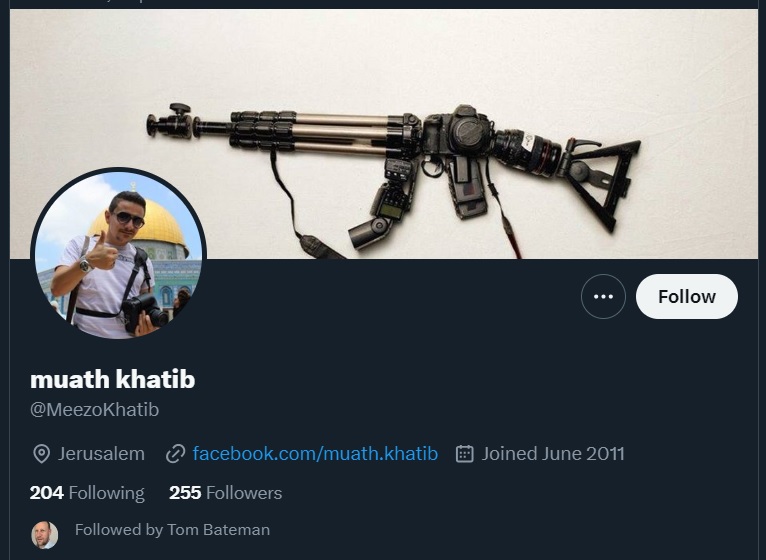
Related Articles:
BBC’S KNELL AGAIN PROMOTES SELECTIVE AND DEFICIENT RAMADAN FRAMING

